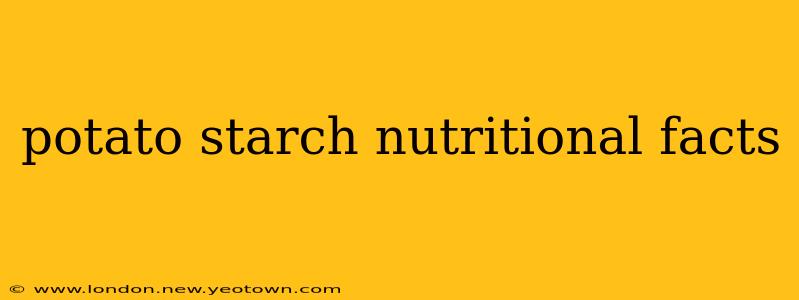Potato starch, a pure white powder derived from potatoes, is a common ingredient in many foods. But beyond its culinary applications, what's the nutritional profile of this versatile starch? Let's unravel the facts and explore its place in a balanced diet. This isn't just a quick rundown; we're going deep, addressing common questions and misconceptions along the way.
What are the nutritional values of potato starch?
Potato starch itself is primarily carbohydrate. A 100-gram serving boasts roughly 90 grams of carbohydrates, predominantly in the form of starch. It's relatively low in fat and protein, typically containing less than 1 gram of each per 100 grams. This makes it a significant source of energy, but not a significant source of essential vitamins or minerals. Unlike whole potatoes, potato starch undergoes processing which removes much of the fiber, vitamins, and minerals present in the original tuber.
Is potato starch gluten-free?
Yes, potato starch is naturally gluten-free, making it a suitable alternative for individuals with celiac disease or gluten sensitivity. This is a key reason for its popularity in gluten-free baking and cooking. Many individuals who are careful about gluten ingestion will confirm potato starch as being a trusted addition to their diets.
How does potato starch compare to other starches?
Compared to other starches like corn starch or tapioca starch, potato starch often boasts a slightly higher amylose content. This impacts its properties in cooking, contributing to a slightly firmer texture in sauces and baked goods. However, the nutritional differences between these starches are relatively minor, all being primarily carbohydrates with minimal protein and fat. The choice often comes down to personal preference, recipe requirements, and availability.
What are the benefits of using potato starch?
While not a powerhouse of nutrients, potato starch offers some culinary advantages. Its neutral flavor makes it ideal for thickening sauces, soups, and gravies without altering the overall taste. It creates a smooth, glossy finish and contributes to a lighter texture compared to some other starches. In baking, it helps to achieve a tender crumb and improve the overall structure of gluten-free products.
Is potato starch healthy?
The healthiness of potato starch depends heavily on context. In moderation, and as part of a balanced diet, it doesn't pose significant health risks. However, its high carbohydrate content means it should be consumed mindfully, especially by individuals managing their blood sugar levels or following low-carb diets. Because of its processed nature and the removal of beneficial components like fiber, it is less nutritious than consuming a whole potato. A balanced diet including a variety of nutrient-rich foods is always recommended.
Does potato starch have any side effects?
For most people, potato starch consumption doesn't lead to significant side effects. However, some individuals might experience digestive discomfort, such as bloating or gas, particularly if they consume large quantities. As with any food, moderation is key. If you notice any adverse reactions, it's best to reduce your intake or consult with a healthcare professional.
What are some common uses of potato starch?
Potato starch finds its way into a wide variety of food applications. It's a common thickening agent in sauces, soups, and stews. In baking, it helps create tender gluten-free breads and cakes, and it can also be used as a dusting agent to prevent sticking. It's even used in some processed foods as a stabilizer or texturizer. Its versatility is truly a testament to its usefulness in food production.
In conclusion, potato starch offers a valuable role in cooking and baking, particularly for gluten-free diets. While not a nutritional powerhouse on its own, its primary function lies in its culinary properties. Understanding its nutritional profile and using it thoughtfully as part of a balanced and varied diet is crucial for reaping its benefits without compromising your overall health. Remember to consult with a healthcare professional or registered dietitian if you have specific dietary concerns or questions.

